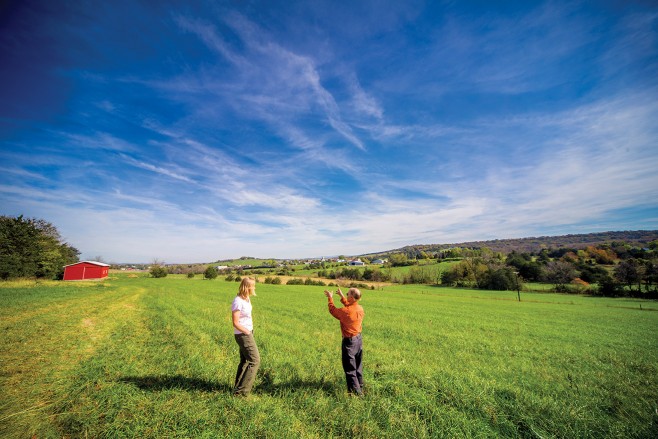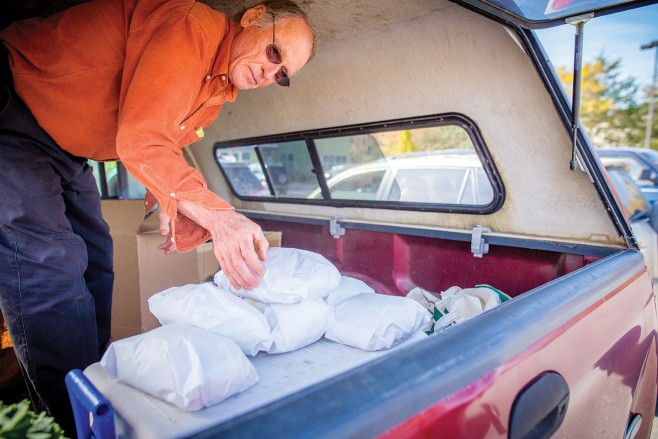
Bob Gillette, MA ’07, points out his future home site to Crossroads editor Lauren Jefferson. Gillette plans to rent the house to Center for Justice and Peacebuilding students, and keep a small basement apartment for his own visits.
Retired lawyer and judge Robert “Bob” Gillette, MA ’07 (conflict transformation) travels a triangle within Virginia these days, from his home city of Suffolk to a mountaintop ranch in Floyd County to a soon-to-be-built-upon piece of land outside Harrisonburg, just over the hill from EMU.
Each place bears a legacy of beneficence. In Suffolk, where Gillette practiced law for 36 years, there are the youth athletic fields at Diamond Springs Park and the Suffolk Athletic Association that Gillette founded. Nearby, the Nansemond Tribe holds a title to 35 acres of their ancestral land that was purchased and returned to them by Gillette after his CJP practicum experience.
In Floyd County is a rustic cabin and farmland, returned to richness through biodynamic farming, with a conservation easement to protect it in perpetuity; and every six weeks or so, loaves of sourdough bread, baked in two earthen ovens and delivered fresh to the “people all up and down the road.”

About every six weeks, Bob Gillette grinds 100 pounds of flour and bakes loaves of sourdough bread in earthen ovens to give away to friends and neighbors.
And in Harrisonburg at EMU, one Steinway piano and an antique clavicord, the assets of an old coin collection, an endowed scholarship for North American graduate students at the Center for Justice and Peacebuilding in memory of his wife Kay, more happy beneficiaries of his bread deliveries, countless friendships and imminent promise of more fellowship with the CJP community, once the house is built – and the bread ovens installed.
“Everything I’m doing now came from opportunity that arose from adversity,” he says. A farm boy who graduated from Randolph-Macon College, Bob met Harrisonburg native Kay Koontz while he was in law school and she was studying math and music at Westhampton College, the women’s affiliate of University of Richmond. Kay was Bob’s first Harrisonburg connection, but the ties grew stronger years later when Bob became a judge, practicing mediation and developing an interest in restorative justice. That ultimately led him to EMU and into Howard Zehr’s class, around the time Kay was stricken with brain cancer.
“I was always a good listening judge,” Bob says, “and I respected people who came in front of me, and you see all kinds from the bench, some pretty poor people. Listening attentively is a kind of gift in itself. It’s an act of love.”
While recognizing the good that came through his profession, Bob also says his practice provided the financial means to meet community needs: In the early ‘70s, as his children became involved in sports, he and a partner purchased land and founded an athletics association that still exists today. After the initial financial investment, Bob describes years of leaving his office and heading straight to the ballfields to maintain and develop the grounds. “I had a lot of fun, learned a lot about soil and land, worked with some great people. That was the first time I really learned what a joy it is to give.”
Bob’s philosophy of giving is based in both practicality – “I’ve never seen a Brinks truck behind a hearse,” he jokes – and a deep joy in helping others. “Why am I here? If it’s not to help each other, I don’t know what it is. You give according to your ability and the resources the Good Lord allowed us to have. And when you give, it does good in the community, and the byproduct of seeing that is a wonderful feeling.”